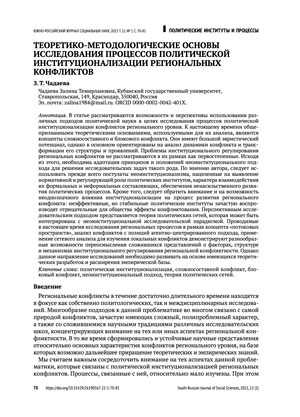Abstract
The article discusses the possibilities and prospects for different approaches of political science to study the processes of political institutionalization of conflicts at the regional level. To date, concepts of complex and bloc conflict have been recognized as the theoretical bases for their analysis. They have great heuristic potential, but are mainly oriented towards analyzing the dynamics of conflict and transforming its structure and manifestations. The institutional management of regional conflicts is not seen as a priority. Therefore, the principles and provisions of the neo-institutional approach need to be adapted to meet research challenges of this kind. In the author’s view, neo-institutionalism should be used primarily to identify the normative and regulatory role of political institutions, the interaction of their formal and informal components, and ensuring non-violent development of political processes. In addition, attention should be drawn to the possible mixed impact of institutionalization on the development of regional conflict: ineffective but stable political institutions often reproduce the negative effects of conflict on society. A promising research approach is the theory of political networks, which can be integrated with the neo-institutional research paradigm. Ongoing studies of regional processes within the concept of “flow spaces”, the analysis of conflicts from an agency-centred perspective, and the application of network analysis to the study of local conflicts demonstrate a variety of possibilities for rethinking the perceptions of the factors, structure and mechanisms of institutional management of regional conflict. However, this area of research needs to be developed on the basis of existing theoretical developments and the expansion of the empirical base.
Keywords
References
Авксентьев, B.А., Зинев, C.Н., Майборода, Э.Т. (2008). «Блоковые конфликты» в полиэтничном макрорегионе: ставропольский феномен. Конфликтология, 3, 145–163.
Авксентьев, В.А. (2008). Блоковый конфликт как новый объект исследования конфликтологии и социологии конфликта. В Материалы III Всероссийского социологического конгресса. Москва: Институт социологии РАН, Российское общество социологов.
Авксентьев, В.А. (2013). Идентификация этнического конфликта как управленческая и как научная проблема. Вестник Южного научного центра, 9(4), 96–103.
Авксентьев, В.А., Гриценко, Г.Д., Дмитриев, А.В., Зинев, С.Н., Майборода, Э.Т. (2009). Конфликтный регион: экспертное мнение. Вестник Южного научного центра, 5(3), 15–21.
Авксентьев, В.А., Зинев, С.Н., Майборода, Э.Т., Лавриненко, Д.А., Лепилкина, О.И. (2010). Блоковые конфликты в полиэтничном макрорегионе. Конфликтология, 1, 133–144.
Аминов, И.Р. (2017). Кластерный анализ потокового пространства региона. Вестник Московского государственного областного университета. Серия: История и политические науки, 4, 155–160.
Аминов, И.Р. (2018). Прикладные исследования потоковых пространств региона и их особенности. В Позитивный опыт регулирования этносоциальных и этнокультурных процессов в регионах Российской Федерации: Материалы III Всероссийской научно-практической конференции (с. 359–362). Казань: Институт истории имени Шигабутдина Марджани Академии наук Республики Татарстан.
Баранов, А.В. (2013). Сложносоставной конфликт в Крыму: внутрирегиональные факторы и стратегии субъектов политики. Политэкс: Политическая Экспертиза, 3, 119–128.
Баранов, А.В. (2015). Трансформация сложносоставного конфликта в Крыму в условиях воссоединения региона с Россией: внутриполитические и внешнеполитические факторы. Политэкс: Политическая Экспертиза, 4, 92–105.
Большаков, А.Г. (2012). Региональные политические конфликты в государствах европейской периферии: концептуально-методологические параметры конфликтологического анализа. PolitBook, 3, 9–22.
Кольба, А.И. (2020). Исследование региональных и городских политических конфликтов: основные концепты и перспективы развития субдисциплин. Полития, 3, 52–73.
Кольба, А.И. (2012). Политические сети в системе управления политическими конфликтами и протестными действиями. Политэкс: Политическая Экспертиза, 3, 36–42.
Кольба, А.И. (2013). Политическое управление конфликтами в регионах современной России (Докторская диссертация). Саратов.
Куркина, Е.С., Князева, Е.Н. (2017). Методология сетевого анализа социальных структур. Философия науки и техники, 22(2), 120–135.
Лавриненко, Д.А. (2009). Блоковые конфликты на Юге России: содержание и менеджмент (Кандидатская диссертация). Ставрополь.
Маркин, В.В., Кинсбурский, А.В. (2020). Сложносоставной региональный конфликт (на примере ситуации вокруг горы Тратау в Республике Башкортостан). Социологическая наука и социальная практика, 8(2), 101–113.
Мирошниченко, И.В., Рябченко, Н.А., Ячменник, К.В. (2017). «Новые» сетевые акторы развития локальной политики в условиях современной России. Вестник Пермского университета. Политология, 1, 150–163.
Мирошниченко, И.В. (2013). Сетевой подход в политических исследованиях: содержание и направления развития. Человек. Сообщество. Управление, 3, 66–84.
Михайленок, О.М., Малышева, Г.А. (2019). Политические эффекты социальных сетей в России. Социологические исследования, 2, 78–87.
Никовская, Л.И. (2009). Сложносоставной конфликт как инструмент анализа трансформации и кризиса. Полис: Политические Исследования, 6, 83–94.
Роговая, А.В. (2008). Региональная конфликтология: исследовательская парадигма (социолого-управленческий аспект) (Кандидатская диссертация). Москва.
Рябченко, Н.А., Мирошниченко, И.В., Гнедаш, А.А. (2020). От «квазикритики власти» к дискурсу «соучастия и развития»: общественная повестка дня в социальных сетях рунета (практики сетевых сообществ). Южно-российский журнал социальных наук, 21(3), 20–36.
Стадник, В.Ю. (2014). Этнополитическая конфликтность студенческой молодёжи Хабаровского края: социологический анализ (Дис. … канд. соц. н.). Хабаровск.
Хелмке, Г., Левитски, С. (2007) Неформальные институты и сравнительная политика. Прогнозис, 2, 188–211.
Якимец, В.Н., Никовская, Л.И. (2005). Сложносоставной конфликт — атрибут постсоциалистической трансформации. Социологические исследования, 5, 77–90.
BenDor, T., Scheffran, J. (2019). Agent-Based Modeling of Environmental Conflict and Cooperation. Boca Raton: Taylor & Francis Group.
Bonabeau, Е. (2002). Agent-based modeling: Methods and techniques for simulating human systems. Proceedings of the National Academy of Sciences, 99(3), 7280–7287.
Lemos, C.M. (2017). Agent-Based Modeling of Social Conflict: From Mechanisms to Complex Behavior. Berlin: Springer-Verlag.
Lemos, C.M., Coelho Н., Lopes R.J. Agent-Based Modeling of Social Conflict, Civil Violence and Revolution: State-of-the-art-review and Further Prospects. Retrieved from http://ceur-ws.org/Vol‑1113/paper10.pdf
Siedschlag, A. (2002). Neoinstitutionalismus als Konfliktstrategie — Möglichkeiten und Grenzen von Institutionalisierungsverfahren der politischen Konfliktregelung. Retrieved from https://www.academia.edu/1340982/Neoinstitutionalismus_als_Konfliktstrategie_Möglichkeiten_und_Grenzen_von_Institutionalisierungsverfahren_der_politischen_Konfliktregelung
Siedschlag, A. (2000). Politische Institutionalisierung und Konflikttransformation: Leitideen, Theoriemodelle und europäische Praxisfälle Wiesbaden: Springer Fachmedien Wiesbaden GmbH.


